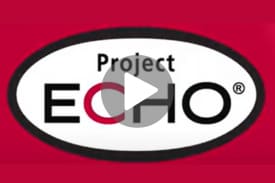Project ECHO: Obesity Medication
Obesity Medication in Pediatric Primary Care

The Obesity Medication in Pediatric Primary Care Project ECHO is designed to help healthcare providers feel more comfortable and confident prescribing and managing obesity medications in alignment with the updated AAP Clinical Practice Guideline for the Evaluation and Treatment of Children and Adolescents With Obesity.
To take part in the Project ECHO, email Strong4LifeProvider@choa.org.
In this article:
What are you committing to with the Project ECHO?
The Project ECHO will take 6 months to complete, with 1 virtual, hour-long session each month. Active participation is expected in each session.
We ask that participating practices submit and present a patient case study at one of the sessions.
Project ECHO session schedule and information
The Obesity Medication in Pediatric Primary Care Project ECHO will consist of 6 virtual sessions, over the course of 6 months. Attendance at every session is strongly encouraged.
Project ECHO session dates
| Date and Time | Topic |
|---|---|
| Thursday, April 24, from 12:30 to 1:30 p.m. |
Weight-Inclusive Approaches to Obesity Care |
| Thursday, May 22, from 12:30 to 1:30 p.m. |
Initiating and Dosing Obesity Medications: Guidelines for Ongoing Pediatric Care |
| Thursday, June 26, from 12:30 to 1:30 p.m. |
Key Considerations for Pediatric Obesity Medication Management: Authorization, Billing and Coding |
| Thursday, July 24, from 12:30 to 1:30 p.m. |
Nutrition and Dietary Factors: Adjusting Medications for Optimal Outcomes |
| Thursday, Aug. 28, from 12:30 to 1:30 p.m. |
Integrating Physical Activity and Body Composition in Pediatric Obesity Management |
| Thursday, Sept. 25, from 12:30 to 1:30 p.m. |
Long-Term Management of Pediatric Obesity: Addressing Chronic Care Needs |
What are the expectations for the patient case study presentations?
One of the key components of Project ECHO is sharing real-life patient cases from daily practice. The case studies not only help everyone involved learn and expand their perspectives, they also provide the opportunity to get feedback from—and collaborate with—other subject matter experts in the field.
- Participating practices are asked to present at least one patient case throughout the series.
- Presentations will be followed by Q&A and discussions.
HIPAA compliance: All patient information will be de-identified for presentation during clinic.
ECHO case consultations do not create, or otherwise establish, a provider-patient relationship between any Children’s Healthcare of Atlanta clinician. Education provided is based on the information provided and should not be considered as a clinical consult.
Is continuing education available for participating?
Yes, the Obesity Medication in Pediatric Primary Care Project ECHO has been approved for Continuing Medical Education (CME) and Maintenance of Certification (MOC) Part II.
Continuing Medical Education (CME)
Children’s Healthcare of Atlanta is accredited by the Medical Association of Georgia to provide continuing medical education for physicians.
Children’s designates this live activity for a maximum of 6.0 AMA PRA Category 1 Credits™. Physicians should claim only the credit commensurate with the extent of their participation in the activity.
Maintenance of Certification (MOC) Part II
Successful completion of this CME activity, which includes participation in the activity, with individual assessments of the participant and feedback to the participant, enables the participant to earn up to 6.0 MOC part II points in the American Board of Pediatrics (ABP) Maintenance of Certification (MOC) program. It is the CME activity provider’s responsibility to submit participant completion information to ACCME for the purpose of granting ABP MOC credit.
Stark Law Disclaimer
In order for Children’s to meet Stark Law regulatory requirements that allow Children’s to provide a limited amount of non-monetary compensation to physicians, we must note your participation in this CME activity at a value of $25 per credit hour. This amount will be applied to your non-monetary compensation allowance. No action is required on your part and you will be notified if you are nearing the limit by the physician education team. The total non-monetary compensation allowed for 2025 is $519.
